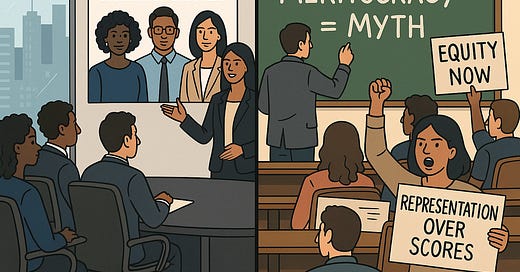Mark Cuban’s Deceptive Defense of DEI
Cuban pitches DEI as harmless strategy—ignoring its ideological roots and fallout in politics and academia.
In a recent episode of The Illusion of Consensus podcast, Rav Arora interviewed billionaire investor Mark Cuban in a revealing discussion about Diversity, Equity, and Inclusion (DEI). Cuban argued that DEI, far from being a radical agenda, is simply a way for businesses to broaden their talent search—not impose quotas or hire less-qualified candidates. But his framing leaves out the deeper ideological push happening in other sectors. You can listen to Part One of the interview here:
(Note: To access the full episode, a subscription is required.)
To his credit, Arora pressed Cuban on the deeper implications of DEI, challenging the conventional corporate talking points. But Cuban, always the smooth operator, had a ready-made response: DEI isn’t about lowering standards or imposing quotas—it’s simply about casting a wider net. Companies, he argued, want the best talent. They follow EEOC rules. If they were hiring unqualified people for the sake of diversity, it would hurt their business. Case closed.
But is it?
Not quite. What Cuban offered wasn’t really a defense of DEI. It was a rebranding. And like many rebrands, it’s more spin than substance.
The Illusion of a Harmless DEI
Cuban’s central claim is deceptively simple: when companies say they aim to hire, say, 30% Black employees, they’re not instituting quotas—they’re just broadcasting their intention to diversify the talent pool. It’s marketing, not policy. Signaling, not discrimination.
And besides, he insists, there are laws. The Equal Employment Opportunity Commission prohibits discrimination based on race or sex. If DEI advocates were breaking the law, they’d get sued. Since lawsuits are rare, the implication is clear: the panic over DEI is misplaced.
This is a very Cuban move: frame the issue as if it were solely about business incentives and legal guardrails. In that world, only the irrational would hire a less-qualified candidate. Only a fool would confuse aspiration with enforcement. Everyone wins.
But the real DEI debate isn’t about what’s happening in boardrooms. It’s about what’s happening in institutions where ideology—not profit—is the dominant currency.
DEI in Theory vs. DEI in Practice
In the political and academic realms, DEI isn’t just a feel-good HR campaign. It’s a worldview. One that says meritocracy is a myth, that disparate outcomes are proof of systemic injustice, and that correcting past wrongs requires unequal treatment in the present.
When Vice President Kamala Harris said “equity” means giving people what they need to achieve the same outcome, she wasn’t talking about casting a wider net. She was talking about managing the outcome—what used to be called social engineering.
In this framework, hiring someone with “lived experience” can outweigh traditional credentials. Identity becomes a qualification unto itself. And if you object, you’re told you’re clinging to outdated norms that only serve the powerful.
Cuban deftly sidesteps all of this. By focusing narrowly on the legal obligations of corporations, he avoids grappling with the ideological drivers of DEI that have taken root in public policy, academia, media, and even medicine.
The Art of the Reframe
What Cuban is really doing is this: he’s laundering DEI through the language of market logic.
Instead of “we need more Black employees,” it’s “we want the best talent and are expanding our search.”
Instead of “hiring to atone for systemic racism,” it’s “diversifying to boost innovation.”
Instead of “equity requires unequal treatment,” it’s “we follow the law and don’t discriminate.”
This allows him to appear reasonable, data-driven, and compliant—while sidestepping the actual tension at the heart of the DEI debate: Can you achieve “equity” without violating the principle of equal treatment?
And more importantly: Should you even try?
The Real Double Standard
Cuban challenged Arora to find any companies that are actually breaking the law. But that's not the real issue. The real issue is that the culture is shifting in ways that make legal violations seem unnecessary.
If every hiring manager is trained to see merit as racially biased, if every resume is read through the lens of “lived experience,” if objecting to DEI initiatives gets you labeled as a liability—you don’t need formal quotas. The effect is the same.
The chilling irony is that by redefining DEI as merely good business, Cuban gives cover to an ideology that doesn’t play by those rules. And in doing so, he helps maintain the illusion of consensus: the comforting lie that we all mean the same thing when we say “diversity,” “equity,” and “inclusion.”
We don’t.
If DEI were truly about expanding opportunity to find the best candidate, it wouldn’t need a rebrand. It wouldn’t need euphemisms or legal hedging. And it wouldn’t be defended by arguing that “at least it’s not illegal.”
It would speak for itself.
But these days, it doesn’t. Mark Cuban just does it better than most.





YES! My local City Council, almost totally Democrat, passed a DEI initiative a couple years ago. I'm working to get it rescinded or reversed. Show me ANY Republican who supports DEI. Show me ANY Democrat which opposes DEI. Any "exceptions" you find, will only prove the "rule" I'm suggesting here. DEI is 100% Democrat political propaganda.
Collectivists have no creativity; it is a feature, not a bug.
They lie, cheat and steal because their ideas suck and always fail in the real world.
Collectivism must be held together by absolute force, that is why we do not see voluntary communes in America